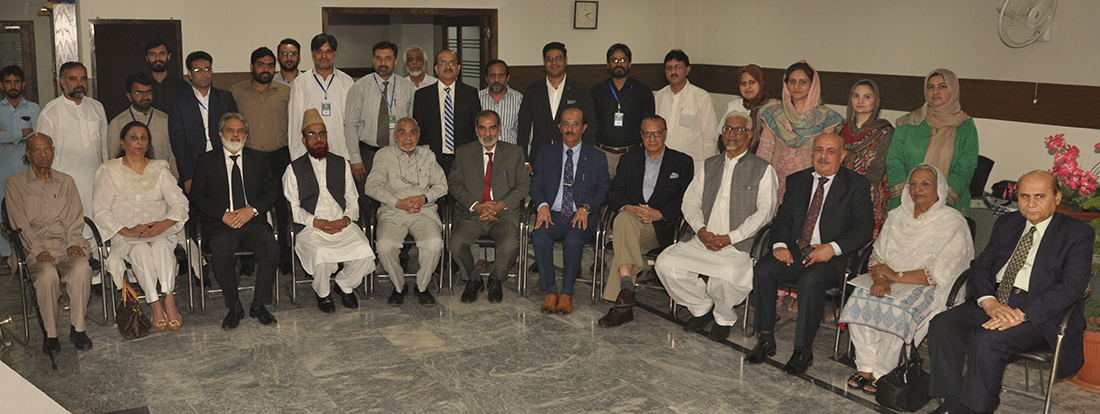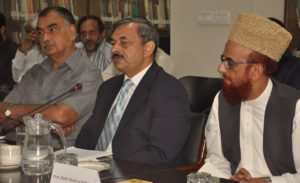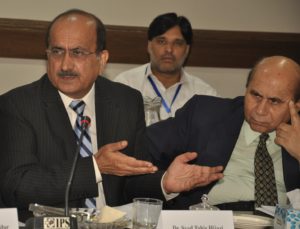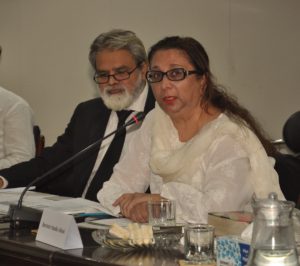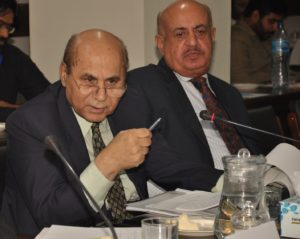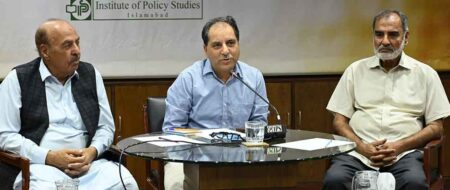Annual Meeting of IPS’ National Academic Council (2019)
Educational reforms urged to meet key national objectives; foster nation-building
Calling educational reforms must to achieve key national objectives as well as to safeguard Pakistan’s interests, members of the National Academic Council (NAC) of Institute of Policy Studies (IPS) were unanimous that such measures will also play a part in mitigating sub-nationalist fragmentation and class divide in the country in order to foster nation-building process effectively.
They were deliberating on key issues the country is faced with at present at the annual meeting of IPS-NAC – an assembly of renowned scholars, academic leaders and experienced practitioners in diverse disciplines brought together on one platform by the Institute to help steer its research work with their guidance and feedback.
The IPS-NAC meeting on 21 September 2019, which was chaired by Khalid Rahman, executive president, IPS, was attended and addressed by Ambassador (r) Shamshad Ahmad Khan, former secretary, foreign affairs, Mirza Hamid Hasan, former secretary, water and power, Dr Waqar Masood, former federal secretary finance, Fasih Uddin, former chief economist, Planning Commission of Pakistan, Dr Sarah Safdar, member, Federal Public Service Commission, Mufti Muneeb-ur-Rehman, president, Tanzeem-ul-Madaris Ahle Sunnat Pakistan, Barrister Saadia Abbasi, former senator, Prof. Dr. Anis Ahmad, vice chancellor, Riphah International University (RIU), Dr Syed Mohammad Anwer, member, Council of Islamic Ideology (CII), Prof Dr Fateh Muhammad Burfat, vice chancellor, University of Sindh, Dr Syed Tahir Hijazi, vice chancellor, Muslim Youth University, Air Cdr (r) Khalid Iqbal, defence analyst, Dr Qasim Bughio, former chairman, Pakistan Academy of Letters, and Amanullah Khan, former president, Rawalpindi Chamber of Commerce and Industry (RCCI).
The participants were of the view that Pakistan’s challenges of Foreign Policy have increased manifold off late as now it needs to balance its relations with China vs America and Iran vs Saudi Arabia simultaneously. The siege of Kashmir has complicated the matters even further, this however is also an opportunity for Pakistan to apprise the international community over the humanitarian crisis being faced by Indian held Kashmir.
They also talked about the political, ideological, social and moral crisis as well as the constant rise in rifts and polarization within the country and stressed on the need to carefully nurture national unity, maintaining that this can be done by efficient use of education and media.
Discussed the ever-increasing role of technology in the modern times and its impact on our social values, the NAC members also lamented the current standing of the country in the world of technology, stating that regretfully we are positioned at the rear end of the fourth industrial revolution, watching other countries take the lead.
Pakistan’s population bulge, lack of agricultural land and privatization of education as some of the areas of growing concern for Pakistan were also pointed; while concern was also shown about the energy and environmental challenges. It was also stated that the issues such as energy from coal, air pollution, global warming and climate change were important national issues which demand serious attention.
The participants also discussed the increasing power of far right political parties in the world especially in the US, Europe and India.
India’s hegemonic designs amidst the Kashmir siege creating a humanitarian crisis were also discussed at length foreseeing more chaos in the region in the coming days. The meeting proposed in-depth study of Indian state and society and the impact of Hindutva ideology on its present and future policies.
The discussants stressed the need for raising the quality of education in Pakistan, the need for the government to pay more attention to educational sector in the country, improving the academic syllabus at different levels, and establishing quality training institutions to foster human development.
Over all, the speakers were unanimous that the change in the country can best be brought only through education. Regretting that the newer generation of Pakistan was not even well-versed with the country’s foundational ideology, let alone its subsequent interests and needs, the speakers saw an urgent need to reform the education policy from the first grade to the last, bringing it in line with national objectives and making it serve as a pathway towards nation-building.


